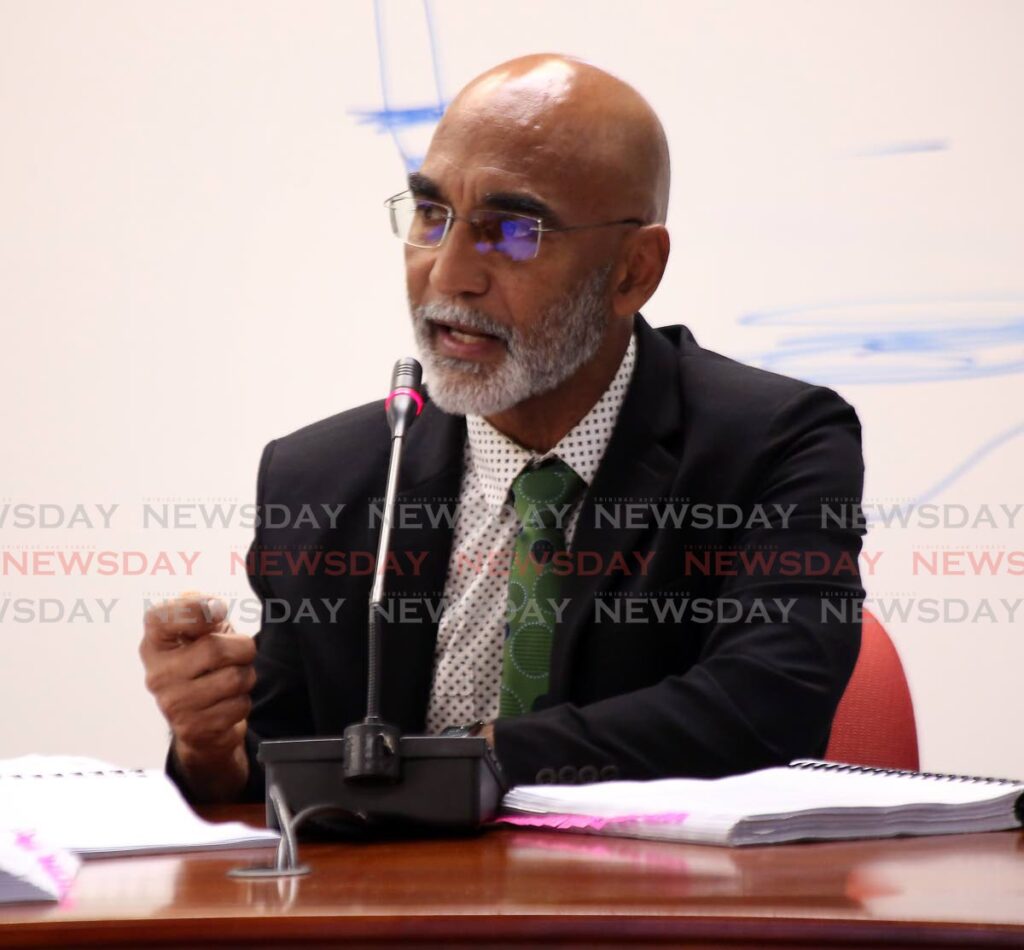I DIDN'T WANT TO LOSE MORE LIVES – Paria manager defends choice to block rescue attempts

PARIA'S terminal operations manager Collin Piper says while he understands why rescue divers whose families were stuck in a 30-inch undersea pipeline were willing to risk their lives to try assisting, he made the "best" and "right" decision by not allowing them to do so as more lives could have been lost. In fact, he believes if he was stuck in that pipeline, he "would not want anybody to be so reckless" with the life of his family members by allowing them to enter.
Piper was testifying at the Commission of Enquiry (CoE) into the February 25 diving tragedy on Thursday afternoon.
Kazim Ali Jr, Fyzal Kurban, Yusuf Henry, Rishi Nagassar and Christopher Boodram were doing maintenance on a 30-inch pipeline at Berth 6, belonging to Paria Fuel Trading Co Ltd, Pointe-a-Pierre, but were sucked into the pipeline. Only Boodram survived.
There were LMCS rescue divers willing to enter the pipeline, including Michael Kurban who is the son of Fyzal Kurban but Piper instructed them not to enter as it was too risky.
In addition, the owner of LMCS, Kazim Ali, is the father of Kazim Ali Jr.
However, Michael Kurban initially disobeyed this order and entered, but was not able to get too far. He managed to retrieve a scuba tank which was blocking camera access inside the pipeline.
Piper maintained that stopping the rescue efforts by these divers was not an easy decision.
He was asked by attorney Nyree Alfonso, who represents the Seamen and Waterfront Workers Trade Union, if when he realised the camera – which, in the end, took five hours to get to the site – was taking too long to arrive, if he did not see the need to send rescue divers with the "appropriate equipment."
An emotional Piper said he was being asked the "same thing repeatedly.
"I had a decision to make. This was no simple time.
"We sit here in this room and we believe that this was just something that was not stressful...We believe in this room that this was not something (in which) we were under strain. We were under pressure, right? That is the furthest things from the truth."
He continued, "We can sit in this room and believe what we want to believe. But put yourself in that position on that night; on that evening. When you have to make a decision to send a man into a pipeline (that is) a quarter of a mile long, you have no idea where this man is going, you have no idea what this man is going to face, you have no idea..."
He said once permission is given to a rescue diver to enter a dangerous situation, "You are accountable for that man's life.
"If you believe that I just sat there and just decided I'm just not sending a man in a pipe, you simply do not understand what we went through that night. That is not something I want anybody in this room or anybody at all to have to go through and to make a decision."
He said it's not as simple as some attorneys were making it seem. As if all it took, was "sending a man and pulling him out with a rope."
As his voice broke, he said people's husbands, sons and fathers were in that pipeline.
"I understand Mr Kurban's courage because his father was in the pipe. I understand why Mr Kurban would want to go into that pipe, and if I was a son (of someone in there), yes.
"But I've also looked at this on the reverse.
"If I was the father in that pipe, would I want somebody to send my son into that pipe after me in a reckless manner where he could perish?
"And every time I ask myself that question, my answer was no. I would not want anybody to be so reckless with my son's life.
"Do you understand what I'm saying? Do you understand what we were faced with?"
Alfonso told him she did not intend to be an "armchair critic" and that she did not think he had an easy job that night.
She then asked if he felt he had a duty to protect the lives of the rescue divers, to which he said yes.
But she followed this up by asking if he did not also have a duty to the four men who died.
CoE chairman Jerome Lynch, KC, intervened and said that Piper had already answered that question.
Piper said he was not just the incident commander that night, but he was a person, so the deaths of the men were "very difficult for me to accept."
Attorney Prakash Ramadhar represents the Henry and Kurban families. He asked Piper if he believes that even with the "best system" in place, if you were to put rubbish into a system, that it would also be rubbish that exited.
"Garbage in, garbage out," he said.
Piper said he took offence to this, to which Ramadhar retorted: "No, don't take offence. Men died. Don't be so thin-skinned."
"Are you a cry baby too? Do you intend to cry here today?"
Lynch then stopped this line of questioning and told Ramadhar to refrain from using that type of language.
On Wednesday, Paria's acting technical lead Catherine Balkissoon cried while she was being cross examined.
Piper said he did not believe he should be subjected to Ramadhar's antics and stood by his view that he made the best decision.
"I could have had four dead divers and I could have had three, four or five rescuers dead."
He said the rescue divers were making decisions based on emotion and instinct during a "chaotic situation," and he had to make a hard decision.


Comments
"I DIDN’T WANT TO LOSE MORE LIVES – Paria manager defends choice to block rescue attempts"